|
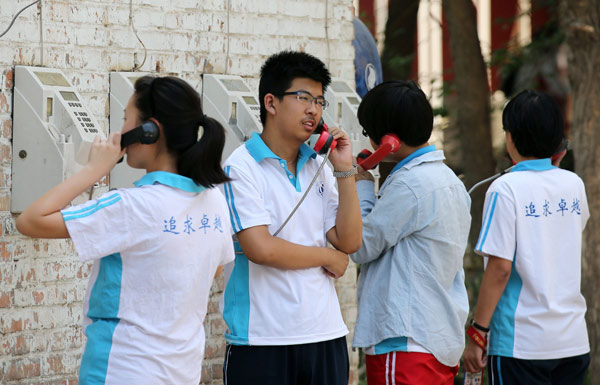 |
| Students at Hengshui High School call their families on Tuesday, four days before the exam. WANG JING / CHINA DAILY |
|
Photo Stories |
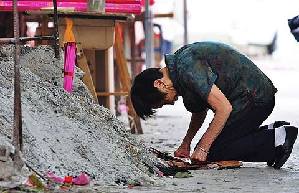 |
| In Anhui, a tree of knowledge? |
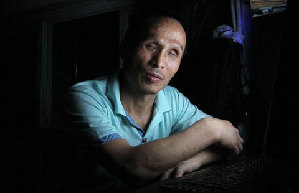 |
| Blind candidates finally allowed to take gaokao |
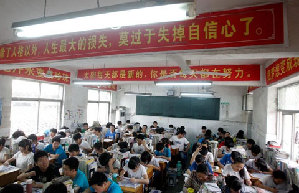 |
| Slogans prepare students for gaokao |
|
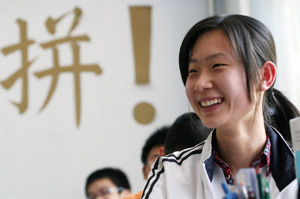 |
While many parents are obviously happy with the system, the teaching model has dissuaded some from sending their children to the school.
"I think the students there are fools and bookworms," one Hengshui city resident said. "After they graduate, they only work for other people and do not dare to start their own businesses. Their thoughts have been imprisoned," said the 35-year-old mother of two, who only gave her surname as Liu.
"I have thought it through and believe that other schools are more likely to guarantee a prosperous future for my children, she said.
'It's fabulous'
Not everyone is critical of the Hengshui High system, though. One freshman, who spoke on condition of anonymity, was effusive in his praise. "After entering the school I discovered that it's fabulous," said the boy, who hails from Baoding, 160 kilometers from Hengshui.
"It's not at all how outsiders describe it. It's not a demon school. Not hell, not purgatory," the 15-year-old said. "There is no rote learning. In fact, students at other schools do that. Some parents say many of the students are just bookworms, but it's not true. Even if you're a bookworm when you arrive, you'll soon change. Choosing to study here was absolutely the right decision," he said, adding that the school offers a variety of activities and clubs - he has joined three - and students are also given the opportunity to take part in national and international competitions, such as UN-style debates, basketball, table tennis and other sports.
The school authorities declined a request for an interview, stating that the gaokao is a "sensitive time", and, "Any report, no matter whether it's positive or negative, will bring the school into new controversy".
Despite this, one teacher agreed to talk, but he declined to be named. "There's been a lot of criticism that we imprison the students, but that's not true - we certainly don't imprison their minds. The teachers only give lessons in half of the classes, and the rest of the time is for the students so they have time to think for themselves and improve themselves," he said.
"Although it's a boarding school, we guarantee access to outside information. Every year, we spend 400,000 yuan ($64,000) on the latest books. Every evening, the students can watch news broadcasts for 20 minutes, even during the gaokao period."
He said discipline is strict and the timetable regimented for good reason: "We have more than 5,000 students on campus. If every student followed their own inclination, what would happen to the school?"
Although the school declined our interview request, we were allowed to visit the campus. As he showed us around an exhibition about science and technology Nobel laureates, the teacher explained that the school is attempting to "plant a seed of interest in science and technology in the students' hearts".
He said the room, which contained 75 desktop computers, is open to students throughout the day. "They can come and search for any information they need at any time during class breaks or meal times," he said. "If our students are interested in a topic that's not covered by the textbooks, we offer them the opportunity to study it," he said, as we walked around a stadium where groups of students were playing table tennis and basketball.
"Six of our students were admitted by universities in Singapore - that's 25 percent of their intake from Hebei. So, if the school is an 'exam factory', does it follow that Singapore is also an exam factory?" he asked.
Some may consider the school's methods controversial, but it has played host to more than 170,000 visitors, mostly teachers and education professionals, in the past 10 years.
Xu Nan, a math teacher at Xingtan High School in Guangdong province, visited late last year. "We visited hoping to learn something that would help improve the quality of teaching in our school," Xu wrote in an e-mail exchange with China Daily. Although the authorities at Xu's school have attempted to put what they learned into practice, so far there has been no marked improvement in results.
'Super high schools'
The phrase "super high schools" has been coined to describe establishments such as Hengshui High. There are similar schools in provinces such as Jiangxi, Anhui, and Hubei, and they not only attract thousands of students who are desperate to attend China's most-prestigious universities, but are also feted by teachers such as Xu who are keen to improve their "teaching quality", factors that usually result in high university entrance rates.
However, some experts believe that the schools' success is a case of cause and effect. "These 'supreme schools' are a direct result of China's college entrance system, which is heavily exam-oriented," said Xiong Bingqi, deputy-president of the 21st Century Education Research Institute.
Xiong said that under the current system, there are three kinds of high school in China: those oriented toward quality of education; those oriented toward exams results; and others that are nominally quality-oriented, but are in reality exam-oriented.
Schools such as Hengshui High are in the third category, according to Xiong, who said very few schools in China would fall into the first category.
"However, criticism yields nothing. It's not the schools that should be blamed, but the system. If the system doesn't change, these 'supreme' high schools will remain unchanged. If Hengshui High didn't follow this model, other schools would," he said.
Under the current system, schools care more about comments from current students and their parents, who attach great importance to the universities their children attend, but often overlook the life and personality training that's important for the students' futures.
"The lack of 'personality education' - a problem in schools all over China - will result in huge problems in the future," according to Xiong, who said few of those who score top marks in the gaokao are successful once they graduate from prestigious universities, and that very few of those who perform well in the exam can be considered "great masters" in the Chinese tradition.
"If the current system doesn't change, there will be no talent to contribute to society in the future, " he said.
Chu Zhaohui, a senior researcher at the National Institute of Education Sciences, echoed Xiong's assessment, saying the gaokao is the reason behind the existence of "super high schools".
"The model employed by high schools such as Hengshui High is an inevitable choice for those disadvantaged by the current college entrance examination system," he said, adding that although many students from less-demanding schools enter prestigious universities, few of them come from poorer families.
"Most students at 'run of the mill' schools are from families on the bottom rung of society, and the gaokao is seen as an opportunity for them to change their destinies. In the short term, the model may help those students, but in the long term, it doesn't work," Chu said.
"Children need pressure to grow up, but that pressure shouldn't be overwhelming. Children require guidance, but should also depend on themselves. Three years is a comparatively short part of a lifetime, and if students can break free of the restrictions imposed by schools such as Hengshui High and start thinking independently again, they can still play a useful role in society."
However, Chu added, "I'm concerned that a large number of them may end up making little real contribution to society and the country, because it's hard to change after three years of being brainwashed."
Contact the writers at houliqiang@chinadaily.com.cn
